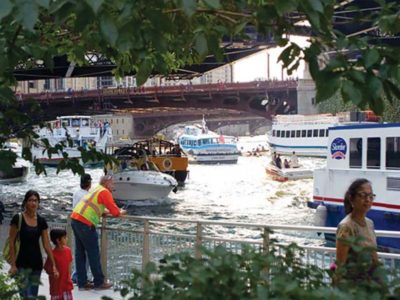Illegal charters are becoming more of a menace, not just cutting into commercial passenger vessel operators’ business but also raising the specter of accidents leading to higher insurance rates and more regulation. The boats also are a draw for licensed captains who may not know the risks.
That was the message delivered last week at the Passenger Vessel Association’s annual convention in Seattle.
The problem has become a lot more prevalent in recent years, said Mike Borgström, president, Wendella Sightseeing Co., a Chicago tour boat operator. Borgström led a session on illegal charters at the PVA convention.
“Why is this important to us as an industry as small passenger vessels?” he asked. “For starters, some of these boats are doing the same thing we’re doing without the inspection criteria. That’s putting people in jeopardy because the boats aren’t inspected, the crew’s not licensed.”
The law requires a boat to be inspected if it carries more than six people with at least one paying passenger. Operators must be licensed to legally carry up to six paying riders. Commercial operators with six or more onboard — with at least one paying — must have a master’s license and a Certificate of Inspection (COI). Bareboat charters may carry a maximum of 12 without a COI. The Coast Guard has several enforcement options including taking control of the vessel, civil penalties up to $37,500, violation notices and revoking a master’s license.
“The Coast Guard has been made aware of more incidents of individuals operating illegally,” said Coast Guard Lt. Cmdr. Tim Tilghman, who’s based in Miami. “People who are good citizens and responsible marine operators” are feeling easier about reporting suspicious charters.
“There have always been instances of people taking vessels that are not Coast Guard inspected saying, ‘I’ll make a little bit of money.’ It’s a slow burn type problem in many areas,” said Ed Welch, the PVA’s legislative director.
“I don’t think people fully understand laws that apply to bareboat charters,” Borgström said. “The public is being misled into thinking it’s safe. Many of these boats wouldn’t stand up to Coast Guard inspection. People have gotten away with it without any repercussions. We need a couple of these guys to get busted big time.”
Borgström showed a few slides of alleged illegal charters and what to look for. One slide showed a boat that operates in Chicago with a crew outfitted in matching shorts. “The boat is not inspected, has no registration numbers, and is registered in the Cayman Islands. They take anywhere from 10 to 30 people out on that boat in and out all day. This is one of those things that you see and something’s not right there. But how do you prove it? That’s up to the Coast Guard."
But Borgström said the Coast Guard is now trained to look for suspicious charters and can take action.
Borgström said that it’s important to note “a lot of this illegal activity is not necessarily being done intentionally. It’s ignorance of the law, ignorance of insurance requirements, it’s whether I think I have a license or I don’t. In most cases, I think all of us on the panel here feel that people that are breaking the law or operating illegally don’t realize it.”
BOAT-SHARING APPS
Now there’s a new wrinkle with boat-sharing applications that connect recreational boat owners with people looking for fun on the water.
“On these boat-sharing apps, you get a mixture of people who are doing things perfectly legally, because they have inspected vessels. Then there are illegal charters,” Welch said.
PVA and its members have been working with the Coast Guard to deal with the issue and discourage the practice, Welch said. They’re also trying to come up with materials to give to licensed captains, who “might not realize insurance from their regular employer might not cover them, and they could lose their license.”
The Coast Guard is looking into boat-sharing apps and making them aware of Coast Guard requirements. The apps operate as third-party negotiators.
“All of our boats have to comply with Coast Guard regulations and laws,” said a spokesman for San Francisco-based GetMyBoat, which bills itself as the world’s largest boat rental and charter marketplace.
Seattle-based Boatbound, another site, describes itself as “the largest and fastest growing pier-to-pier boat rental marketplace in the world.” The company has over 15,000 boats listed in 2,100 cities. It’s core features are marketing and insurance, and also offers payment processing and booking management tools.
Borgström said Boatbound is one of the good ones.
“Let’s be clear,” Borgström said at PVA. “Illegal charters and Boatbound don’t go together.”
"The on-demand type platforms are the ones that give everyone a bad name,” said Boatbound’s Chris Fox, who was on the panel with Borgström at PVA. “These are the ones that are highly illegal and they don’t care.”
“We applaud what you’re doing with your website,” Borgström said, “but the concern we have is when these guys get kicked off of your website and can’t rent the boat from you they’re going to go to somebody else. So they’re still out there. We just need to figure out who those bad players are.” — Correspondent Dale K. DuPont contributed to this report.





